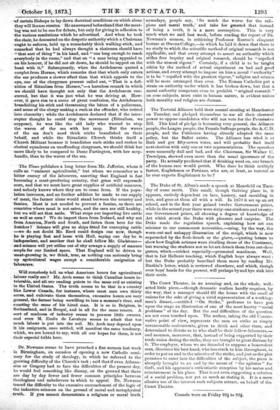Dr. Newman seems to have preached a tine sermon last
week in Birmingham, on occasion of opening a new Catholic semi- nary for the study of theology, in which he referred to the growing difficulty of the Church's task ; said that if even Athena- sius or Gregory had to face the difficulties of the present day, he would feel something like dismay, on the ground that there are day by day fewer and fewer common principles between theologians and unbelievers to which to appeal. Dr. Newman traced the difficulty to the excessive encroachment of the logic of the inductive sciences on the ground of moral and metaphysical truth. If you cannot demonstrate a religious or moral truth
nowadays, people say, 'So much the worse for the reli- gious and moral truth,' and take for granted that instead of being a truth, it is a mere assumption. This is very much what we said last week, before reading the report of Dr. Newman's sermon, in. criticising Professor Roscoe's eloquent 'lecture at Owens College,—in which he laid it down that there is no study to which the scientific method of original research is not applicable, and that every attempt to assert an authority which stifle& free inquiry and original research, should be "repelled with the utmost vigour." Certainly, if a child is to be taught ethics by the method of actual experiment on bad and good actions, and every attempt to impose on him a moral "authority"
• is to be "repelled with the greatest vigour," religion and science will be more estranged than ever. The Roman Catholics put a strain on authority under which it has broken down, but that a moral authority competent even to prohibit "original research" on some subjects, must exist in human nature, is evident unless both morality and religion are dreams.


































 Previous page
Previous page